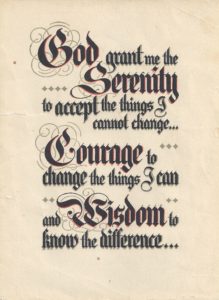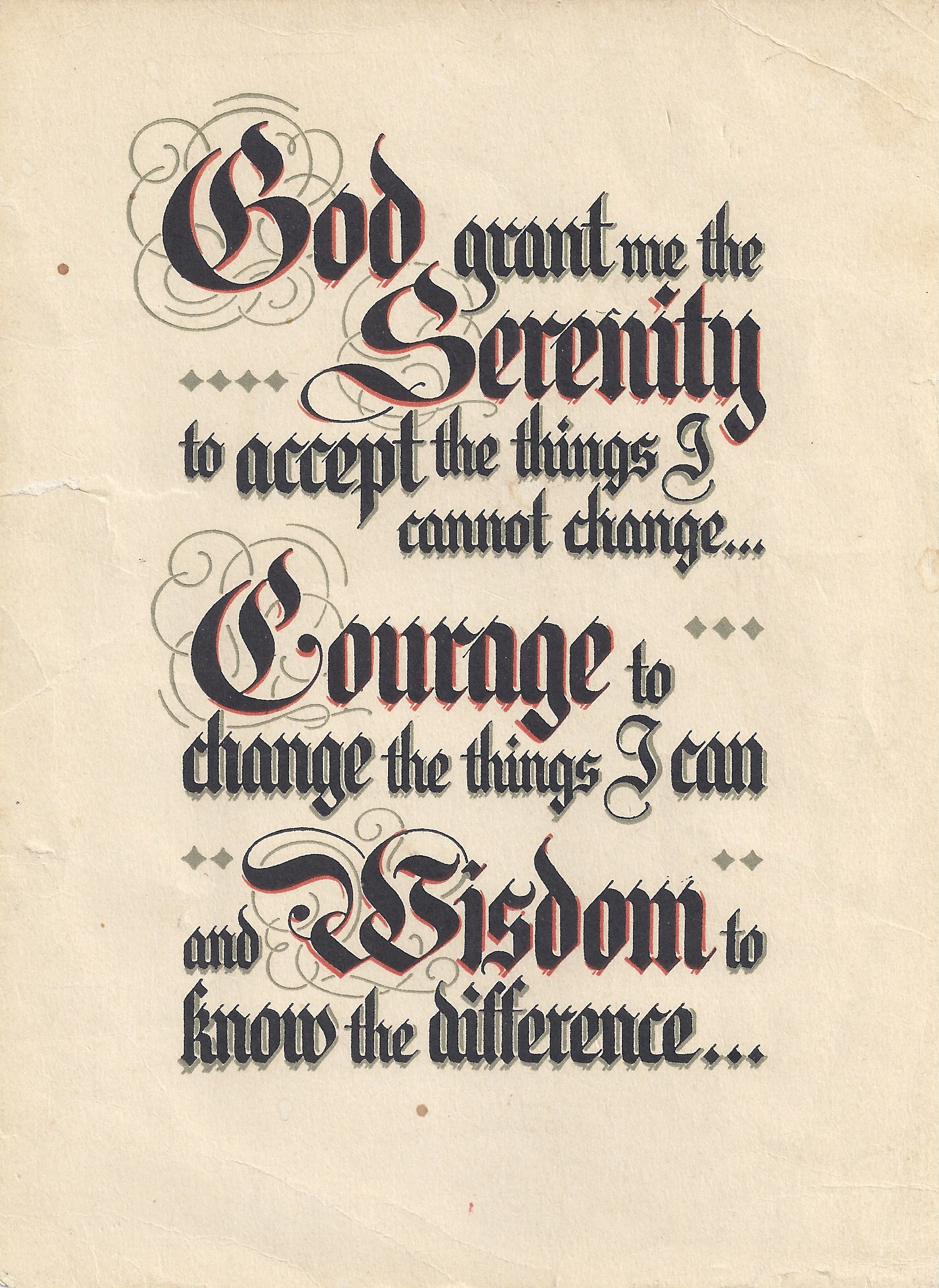 Alcoholics Anonymous and the Serenity Prayer are forever bound together. The prayer originated with the American theologian, Reinhold Niebuhr, but its dissemination within the wider culture occurred through A.A. So there are two distinct historical threads that can be followed in tracing the history and use of the prayer. One thread follows its presence through A.A. itself and another traces its origins with Niebuhr. This article will concentrate on the A.A. connection, while another one, “Reinhold Niebuhr and the Serenity Prayer,” will trace its origins with Niebuhr.
Alcoholics Anonymous and the Serenity Prayer are forever bound together. The prayer originated with the American theologian, Reinhold Niebuhr, but its dissemination within the wider culture occurred through A.A. So there are two distinct historical threads that can be followed in tracing the history and use of the prayer. One thread follows its presence through A.A. itself and another traces its origins with Niebuhr. This article will concentrate on the A.A. connection, while another one, “Reinhold Niebuhr and the Serenity Prayer,” will trace its origins with Niebuhr.
Pass It On is the A.A. approved history of Bill W. and how the message of A.A. reached the world. It described how one of its members saw the prayer in an obituary of an early June 1941 edition of a New York paper, the Herald-Tribune. Pass It On quoted it as existing then in its commonly received form: “God grant me the serenity to accept the things I cannot change, courage to change the things I can, and the wisdom to know the difference.” An A.A. member had the idea to print the prayer on cards and paid for that first printing out of his own pocket.
It was initially referred to as: “the A.A. prayer” or “God grant us” by A.A. members. But by the late 1940s, it became known as the Serenity Prayer. Nell Wing, the first A.A. Archivist and a secretary to Bill W., wrote “Origin of the Serenity Prayer: A Historical Paper” in 1981. She quoted from a June 12, 1941 letter written by Ruth Hock, the A.A. secretary at that time, to an A.A. member and a printer by trade about getting the prayer printed on a wallet-sized card. He responded:
Your cards are on the way and my congratulations to the man who discovered that in the paper. I can’t recall any sentence that packs quite the wallop that does and during the day shown it to the A.A.’s that dropped in and in each case have been asked for copies.
In the January 1950 edition of the AA Grapevine, an article appeared that “solved” the mystery of the origins of the Serenity Prayer. Although its origin had been previously attributed to several different sources, the article said it originated with Dr. Reinhold Niebuhr. He was said to have written it around 1932 as the ending of a longer prayer. In 1934 a friend asked Niebuhr’s permission to use the shorter section in a compilation of prayers he was making at the time. Niebuhr was quoted as saying: “Of course, it may have been spooking around for years, even centuries, but I don’t think so. I honestly do believe that I wrote it myself.”
According to the AA Grapevine article, the original form of the prayer, as written by Niebuhr was: “God give me the serenity to accept things which cannot be changed; Give me courage to change things which must be changed; And the wisdom to distinguish one from the other.” The article said Dr. Neibuhr didn’t mind the changes from his original rendering of the prayer, saying: “In some respects, I believe your way is better.”
Nell Wing’s article reviewed the variety of supposed original sources for the Serenity Prayer, which included: St. Francis of Assisi, the early Greeks or Aristotle, St. Thomas Aquinas, St. Augustine, the Dutch philosopher Baruch Spinoza, and even ancient Sanskrit writings. Research done by a German member of A.A. Peter T., attributed the first written form of the prayer to a Roman statesman and Christian philosopher named Boethius (480-524). Wing added in a footnote:
While this is a fascinating story in its own right and appears to correct a long-standing misconception, Boethius’ connection with the prayer remains unclear and haunting! What were his thoughts and ideas that so affected succeeding generations of religious dissidents?
Boethius was born in Rome and educated in Athens and Alexandria. In 510 he became a Consul under Emperor Theodoric. He was accused of treasonable dealings with the emperor in Constantinople, imprisoned and eventually beheaded. While in prison he wrote The Consolation of Philosophy, his most influential work and that from which Peter T. said the first form of the Serenity Prayer appeared. His commentaries on Aristotle became a major source of knowledge of Platonic and Aristotelian ideas in the Middle Ages. More information on Boethius can be found in: New Dictionary of Theology; and Classical Pastoral Care, Volume 4: Crisis Ministries. You can also read this article on him by Carl Trueman: “Boethius: The Philosopher Theologian.”
In Alcoholics Anonymous Comes of Age, Bill W. said when he first saw the Serenity Prayer on that day in June of 1941, “Never had we seen so much A.A. in so few words.” After the cards were printed up, A.A. included one in every piece of correspondence they sent out. This continued for several years, and the Serenity Prayer rapidly came into general use within A.A. After reiterating the possible origins of the prayer, Bill said: “Anyhow, we have the prayer and it is said thousands of times daily. We count its writer among our great benefactors.” Over 950 references have been made to the Serenity Prayer in the AA Grapevine since its first issue in 1944.
What is it about this prayer that gives it so much value for A.A.? Bill W. unpacked its usefulness in his article for the March 1962 issue of the AA Grapevine, “What is Acceptance?” This article is also available in the A.A. published selection of Bill W.’s Grapevine writings, The Language of the Heart. Bill said one of the ways to get at the meaning of the principle of acceptance is to meditate on it within the context of the Serenity Prayer. Essentially it is asking for the resources of grace by which we can make spiritual progress. Emphasized within the prayer is the need for wisdom that discriminates between the possible and the impossible.
Sometimes we need the right kind of acceptance for each day. Other times we need to develop acceptance for what will come in the future. Yet again, we may have to accept a situation that will never change. Then there are misuses of acceptance. “It can be warped to justify nearly every brand of weakness, nonsense and folly.” We can “accept” failure as a chronic condition without failure or remedy. We can pridefully “accept” worldly success as something we did ourselves.
This is why we treasure our “Serenity Prayer” so much. It brings a new light to us that can dissipate our old-time and nearly fatal habit of fooling ourselves. In the radiance of this prayer we see that defeat, rightly accepted, need be no disaster. We now know that we do not have to run away, nor ought we again try to overcome adversity by still another bull-dozing power drive that can only push up obstacles before us faster than they can be taken down. . . . Therefore our very first problem is to accept our present circumstances as they are, ourselves as we are, and the people about us as they are. This is to adopt a realistic humility without which no genuine advance can even begin. Again and again, we shall need to return to that unflattering point of departure. This is an exercise in acceptance that we can profitably practice every day of our lives. Provided we strenuously avoid turning these realistic surveys of the facts of life into unrealistic alibis for apathy or defeatism, they can be the sure foundation upon which increased emotional health and therefore spiritual progress can be built. At least this seems to be my own experience.
I’ve read an article that sees the Serenity Prayer as creating an either/or, black-and-white dichotomy, “as if all of the situations and challenges that a person in recovery is confronted by can be neatly placed into one or the other bucket.” But I don’t see Bill W. using the Serenity Prayer as a black-and-white dichotomy. He said it emphasizes the need for wisdom to discriminate between the possible and impossible. He also said there can be misuses of acceptance—when it is used to justify “weakness, nonsense and folly.” The goal of acceptance in the Serenity Prayer, at least for Bill W. and A.A., is to have humility; to avoid turning a realistic assessment of the situation into an alibi or excuse for apathy or defeatism.





